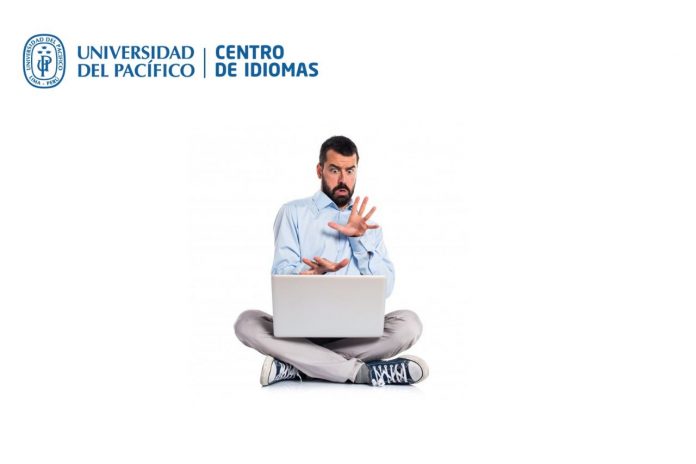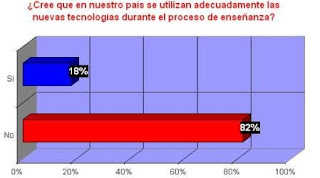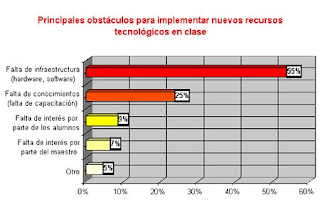Seemingly using technology in the educational field is today the name of the game. More than 4 million students in Latin America have an individual electronic device conducive to support its differentiated learning. (Severin and Capota) Phones, tablets and kindles (digital book readers) are expanding places of learning beyond schools. In countries such as ours, in addition, programs like “One Laptop per Child are being embraced. Yet, in spite of all this, there is a large number of teachers who have real fear of technology.
The Confederación Española de Centros de Enseñanza, CECE (Spanish Confederation of Schools) indicates that 70% of primary and secondary schools of that country do not have projects of educational computerization and 40% of teachers do not use information technology and communication (ITC) in the Classroom. They consider that the main reason for this is lack of training.
The aforementioned report also says that six out of ten teachers use these technologies in the classroom, but 35% said they “would be willing to use them but do not dare”, while 5% reveal they are not interested in using them whatever the case.
In our country, although we have no precise figures due to lack of statistics, the portal Universia Peru, disclosed that 82% of teachers participating in a recent survey they conducted do not believe that new technologies are used appropriately in class. In opposition to that, 97% of respondents sustained –at the same time– that new technologies mean “an opportunity” to improve education in the country.
The teachers responding considered that the main obstacle in implementing technological resources in their classes, is the lack or inadequacy of the infrastructure installed in their workplaces. But we consider that at the kernel of the dilemma is the lack of proper training.
In recent years most private schools in Lima and other large Peruvian cities, and a good deal of public ones, have been equipped with computers, projectors, screens, sound systems and sometimes even smart boards. School administrators have been willing to dedicate significant sums to equip their classrooms. But unfortunately they did not often allocate a similar amount to train their personnel. And this is the result.
This is not a phenomenon restricted to Peru, not even to the Third World. The Guardian. Influential daily British newspaper, reported that some 30% of teachers surveyed by the University of Bristol failed to make good use of computers in the classroom — despite the government’s £1bn investment. The study divulges that many teachers dread computers will interfere with ‘genuine’ or book-based learning, particularly in the humanities and creative subjects, and use ICTs only for administration and routine tasks. Furthermore, the document implies that many instructors lack the confidence to take the risk of using technology in their subject areas, although they have reasonable facilities at school and they use computers at home.
On a more earthly terrain, on the part of the teachers, there is a fear of letting go of control. Besides this, many educators are uncertain about their own ability to create tech-integrated lessons. On addition, while books are perceived as educational and as the classic vehicle to approach ethos, (acquire knowledge) there is a cultural association of computers with business as well as leisure, play and slackening.
Beyond that is the anxiety of teachers at handling costly equipment. Who will pay if something breaks? They also worry about off-task behavior online and cyber bulling. That leads to the establishment of many anti-technology rules in the name of safety.
Other instructors find it very difficult to recognize the wrongness and untimeliness of their non-tech approach. The argument that computers have been oversold and underused is not completely deprived of accuracy, although we identify it many times as a cop-out.
But perhaps one of the strongest arguments that lead educators into the inactivity corner is the recognition that in these matters it is very frequent that the students outperform their teachers. And a good number of us are not willing to ask our students what to do with the devices or how to do things with the seemingly uncooperative machines. Maybe they still live in the time when teachers were supposed to be the depository of all knowledge. On our part, we feel no shame in asking students and plea for their help. And they are usually cheerful to award it.
Now your turn:
Have you ever wondered if Technology in Education is a friend or a foe?
Do you know why High-Tech sends a chill down the teachers’ spine?
We are looking forward to your posts letting us know what you think.
Estimated reading time: 3 minutes, 48 seconds













FEAR of the UNKNOWN is what prompts fear itself;
RESOLVE the unknown, and fear will be NO MORE!
Reality Quote by:
Hugo Vergaray Otoya.
As I was reading I couldn´t help taking a trip down memory lane. I used to be glad to be a member of the non-tech teachers and getting down to use technological resources was certainly quite hard. From my point of view, it's a blessing rather than a foe. However, I can tell why some teachers are reluctant to it. The factors are as follows:
– Inadequate resources : using hardware as a marketing tool though being outdated or underused.
– Lack of training: investment of large amounts of money on cutting edge tech without proper, opportune and consistent investment on RH training.
– Fear of change: psychologically, whenever we find something inconsistent with our concepts of the world, stress will come up. The outcome doesn´t matter, it will always stress you out.
– Taking people out of their comfort zone freaks them out and therefore ending up not feeling at ease and especially getting a sense of losing control.
To sum up, high-tech resources are welcome, beneficial and necessary to enhance and maximize the teachers´performance in class. Nevertheless, there is something we have to bear in mind: what sends chills down their spines is the fear of the unknown, the lack of training (and consequent risk of being outperformed) and the disturbance of their comfort zone. That simple!
Luis Avila
Comments are closed.